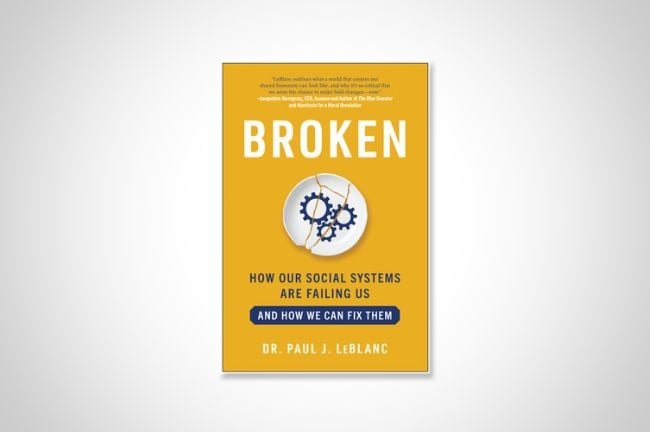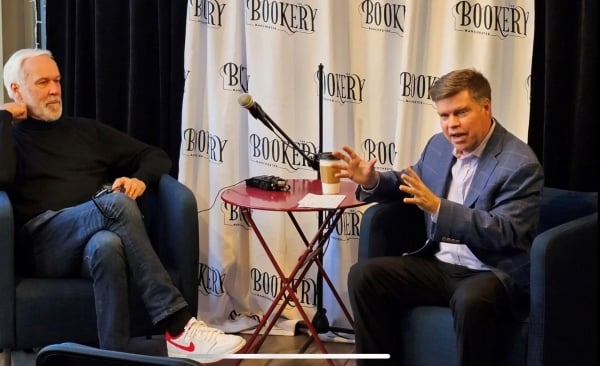You have /5 articles left.
Sign up for a free account or log in.

Penguin Random House
When Jason Palmer told me that Paul LeBlanc’s book Broken: How Our Social Systems Are Failing Us and How We Can Fix Them inspired him to run for president, I knew that I had to hear that story. Jason graciously agreed to share that story with our Inside Higher Ed community. What follows is something of a guest post that Jason wrote, explaining the connection between Paul’s book and his candidacy.

Jason Palmer: When I worked at the Gates Foundation from 2013 to 2016, our team invested $100 million annually, trying to improve postsecondary success by supporting innovative colleges and universities attempting to scale evidence-based solutions like pathways, integrated planning and advising, emergency financial aid, digital courseware, and 15 to Finish. That work continues under Patrick Methvin’s leadership.
At first, I honestly thought that with $100 million per year, a great team and a data-driven approach, we should be able to help millions more students graduate and get jobs in the middle class within a decade. However, I quickly learned (because we hired research firms to conduct rigorous evaluations) that most grants barely demonstrated any progress after two years of implementation. Some had a positive effect after five years, and a handful showed meaningful positive impact after 10 years. Change is hard.
Big structural problems like improving U.S. higher education’s 62 percent graduation rate or America’s declining life expectancy, despite our wealth, are wicked hard problems to solve. They require change at the policy level, the federal and state government level, and technology, too.
Roll forward six years: I’m working with my partners at New Markets Venture Partners as a VC, investing and helping build some of the most exciting ed-tech companies—Credly, Mursion, LearnPlatform, Climb Credit, Regent Education, more than 30 start-ups across K-12, higher education and workforce. New Markets has been a leader in impact investing for almost two decades, and my partners, Mark and Robb, were pioneers in publishing annual impact reports. Technology innovation works, and New Markets’ companies have measurably improved economic mobility for 72 million lives.
It was around this time, in the middle of 2023, that I encountered Paul LeBlanc’s book Broken: How Our Social Systems Are Failing Us and How We Can Fix Them. I’ve known Paul for almost two decades. My favorite professor in grad school was Clay Christensen, the inventor of disruptive innovation. Clay was a board member and adviser to LeBlanc at Southern New Hampshire University. Most readers of Inside Higher Ed undoubtedly know that LeBlanc and his team fully adopted and adapted the principles of disruptive innovation to grow SNHU from 2,500 to 225,000 students over 20 years, and I’ve always admired Paul’s incredible ability to take a theory of business and apply it to the field of higher education. That’s rare and incredibly impressive.
So when Broken came out, I immediately wanted to understand Paul’s thoughts about how we might use technology and disruptive innovation theory to address America’s broader social challenges. Did Paul have ideas for transforming health care; making housing more affordable; thoughts about solving homelessness, poverty and criminal justice; maybe even ideas we could apply to climate change?
I devoured the Kindle version of the book in less than 72 hours. And then I read it again more slowly, highlighting what I thought was most interesting and relevant.
“The U.S. spends enormous sums on [government] systems—$3.8 trillion on health care, $182 billion on prisons and $632 billion on higher education—and yet they routinely fail us … Deaths of despair, civil unrest, political schisms and loneliness amid the hyper-connectedness in modern American life have their roots in humanity denied, the anger and resignation of people who feel as though they do not matter to the world or the systems meant to serve them … When systems fail the people they are meant to serve, it’s almost always because of a failure of human values more than any inherent attribute of the system.”
Some of the book was expected—about the power of technology, how online systems can be more efficient and effective at delivering value than in-person, manual systems—but much of it was not expected. The book is about dreaming big dreams, the power of stories and building systems where people matter. Of course people matter, but Paul writes about loving his team, creating a culture of love to help students succeed and putting people first. These sections of the book directly inspired the pillars of my presidential platform related to building a new-collar economy that’s people first.
I was also surprised to see that Paul’s book included a whole section about conscious capitalism. I had no idea that Paul even knew about B-corporations and impact investing, the sector of the economy where I’ve dedicated my life’s work, following in the footsteps of my business partners Mark, Robb and Don.
For those of you who don’t know about conscious capitalism, over the past 30 years, a growing movement of business leaders, impact investors, philanthropists and academic scholars have identified themselves as proponents of this economic philosophy, and I have to say I love it. Business can be about more than just making a profit. It can be about a higher purpose, doing good and making the world a better place—double bottom line.
Working as an entrepreneur and impact investor over the past two decades, I’ve seen firsthand how conscious capitalism could offer a better path for America, calling on corporations to follow ethical business practices to drive equitable economic growth. Conscious companies don’t just exist to serve shareholders. They serve multiple stakeholders, including employees, customers, community and the environment. Some of America’s most successful companies, including Trader Joe’s, Costco and Patagonia, follow these principles.
This movement has even captured the imaginations of even the staunchest C-corporations. A defining moment was 2019, when 180 major Business Roundtable companies issued a major statement on corporate purpose. Prominent members such as JPMorgan Chase, Amazon and Apple committed to serving not just shareholders but also their employees, communities and the environment. This paradigm shift by globally influential corporations offered a viable beginning but fell short of being the full transformation our system needs.
Transcending theory, 40 U.S. states have already passed laws encouraging and legalizing B-corporations as an alternative to C-corporations. These benefit corporations intentionally serve multiple stakeholders.
All of this is written about in Broken—and much more, too. The latter half of the book goes into detail about how we need to build human-focused systems at scale, combining the power of technology with caring individuals amplified by data and software. Paul’s section on the role of people in a world that’s increasingly transformed by technology and AI helped inspire my policies related to job displacement and upskilling and this video created by my presidential campaign staff.
These later sections of the book helped inspire my plans to modernize government.
Our political system has become broken and polarized. Americans are being bombarded with a perfect storm of multiple foreign wars, high inflation, racial and ethnic tensions, climate change, increasing crime, the last vestiges of a global pandemic, and AI that could eliminate half of all jobs by 2030. Traditional candidates for public office are stoking the flames, offering 20th-century solutions to 21st-century problems.
Ultimately, Paul’s book and a number of supportive friends encouraged me to throw my hat in the ring and offer a very different, positive, optimistic vision of reinventing the American dream for the 21st century. We’re trying to focus on energizing young people and center-left/center-right problem-solvers, the exact kind of people who are reading Broken and other similar books. Probably people like you!
Too many of us have become disengaged by our current political system and don’t support either big government or big business as the way forward. We must invest much more in our young people—students and workers—by dramatically upgrading our education-to-employment system. We can rebuild our government and laws on a modern platform that puts investments in people first.
Because of my decades of experience as a technology entrepreneur, turnaround leader and impact investor, my candidacy offers a distinct alternative to any other candidate. Our plan is based on putting people first on the solid foundation of conscious capitalism. Millions of us are already working as entrepreneurs and builders at the intersection of public/private innovation, and we are ready to return America to a land of respect, civility, kindness and inclusion. We believe the torch needs to be passed to a new generation of fellow mission-driven Americans. We can do this, together!




